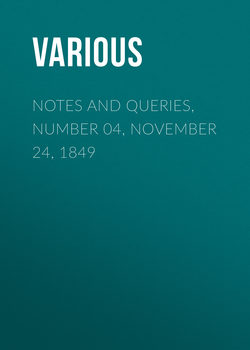Notes and Queries, Number 04, November 24, 1849

Реклама. ООО «ЛитРес», ИНН: 7719571260.
Оглавление
Various. Notes and Queries, Number 04, November 24, 1849
OUR PROGRESS AND PROSPECTS
NOTES
LATIN EPIGRAM AGAINST LUTHER AND ERASMUS
HALLAMS MIDDLE AGES—ALLEGED IGNORANCE OF THE CLERGY
ADVERSARIA
ORIGIN OF WORD "GROG."
ORIGIN OF WORD "GROG"—ANCIENT ALMS-BASINS
DYCE VERSUS WARBURTON AND COLLIER—AND SHAKSPEARE'S MSS
FOOD OF THE PEOPLE.—BILLS OF FARE IN 1683—HUMBLE PIE
BISHOP BARNABY
TRADE EDITIONS—COTTLE'S LIFE OF COLERIDGE
DIBDIN'S TYPOGRAPHICAL ANTIQUITIES
QUERIES ANSWERED, NO. 2. MADOC THE SON OF OWEN GWYNED
MADOC—HIS EXPEDITION TO AMERICA
MADOC'S EXPEDITION
QUERIES
"CLOUDS" OR SHROUDS, IN SHAKESPEARE
MEDAL OF THE PRETENDER
ROGER DE COVERLEY
HISTORY OF LANDED AND COMMERCIAL POLICY OF ENGLAND—HISTORY OF EDWARD II
THE REVEREND THOMAS LEMAN
GOTHIC ARCHITECTURE
KATHERINE PEGG
QUERIES IN MEDIÆVAL GEOGRAPHY
MYLES BLOOMFYLDE AND WILLIAM BLOMEFIELD'S METRICAL WRITINGS ON ALCHYMY
THYNNE'S COLLECTION OF CHANCELLORS
COLD HARBOUR
STATISTICS OF THE ROMAN CATHOLIC CHURCH
INCUMBENTS OF CHURCH LIVINGS
THE CURSE OF SCOTLAND—WHY IS THE NINE OF DIAMONDS SO CALLED?
NOTES OF BOOK SALES—CATALOGUES, ETC
BOOKS AND ODD VOLUMES WANTED TO PURCHASE
NOTICES TO CORRESPONDENTS
Отрывок из книги
Mr. Editor,—Your correspondent "Roterodamus" (pp. 27, 28) asks, I hope, for the author of the epigram which he quotes, with a view to a life of his great townsman, Erasmus. Such a book, written by some competent hand, and in an enlarged and liberal spirit, would be a noble addition to the literature of Europe. There is no civilised country that does not feel an interest in the labours and in the fame of Erasmus. I am able to answer your correspondents question, but it is entirely by chance. I read the epigram which he quotes several years ago, in a book of a kind which one would like to see better known in this country—a typographical or bibliographical history of Douay. It is entitled, "Bibliographie Douaisienne, ou Catalogue Historique et Raisonné des Livres imprimés à Douai depuis l'année 1563 jusqu'a nos jours, avec des notes bibliographiques et littéraires; Par H.R. Duthilloeul. 8vo. Douai, 1842." The 111th book noticed in the volume is entitled, "Epigrammata in Hæreticos. Authore Andrea Frusio, Societatis Jesu. Tres-petit in 8vo. 1596." The book is stated to contain 251 epigrams, "aimed," says M. Duthilloeul, "at the heretics and their doctrines. The author has but one design, which is to render odious and ridiculous, the lives, persons, and errors of the apostles of the Reformation." He quotes three of the epigrams, the third being the one your correspondent has given you. It has this title, "De Lutheri et Erasmi differentia," and is the 209th epigram in the book.
I have never met with a copy of the work of Frusius, nor do I know any thing of him as an author. The learned writer who pours out a store of curious learning in the pages of Gentleman's Magazine is more likely than any body that I know to tell you something about him.
.....
Christina of Sweden had quite a mania for writing in her books. In the library of the Roman College (at Rome) there are several books annotated by her, amongst others a Quintus Curtius, in which, as it would appear, she criticises very freely the conduct of Alexander. "He reasons falsely in this case," she writes on one page; and elsewhere, "I should have acted diametrically opposite; I should have pardoned;" and again, further on, "I should have exercised clemency;" an assertion, however, we may be permitted to doubt, when we consider what sort of clemency was exercised towards Monaldeschi. Upon the fly-leaf of a Seneca (Elzevir), she has written, "Adversus virtutem possunt calamitates damna et injuriæ quod adversus solem nebulæ possunt." The library of the Convent of the Holy Cross of Jerusalem at Rome, possesses a copy of the Bibliotheca Hispanu, in the first volume of which the same princess has written on the subject of a book relating to her conversion:* "Chi l'ha scritta, non lo sa; chi lo sa, non l'ha mai scritta."
Lemontey has published some very curious Memoirs, which had been entirely written on the fly-leaves and margins of a missal by J. de Coligny, who died in 1686.
.....